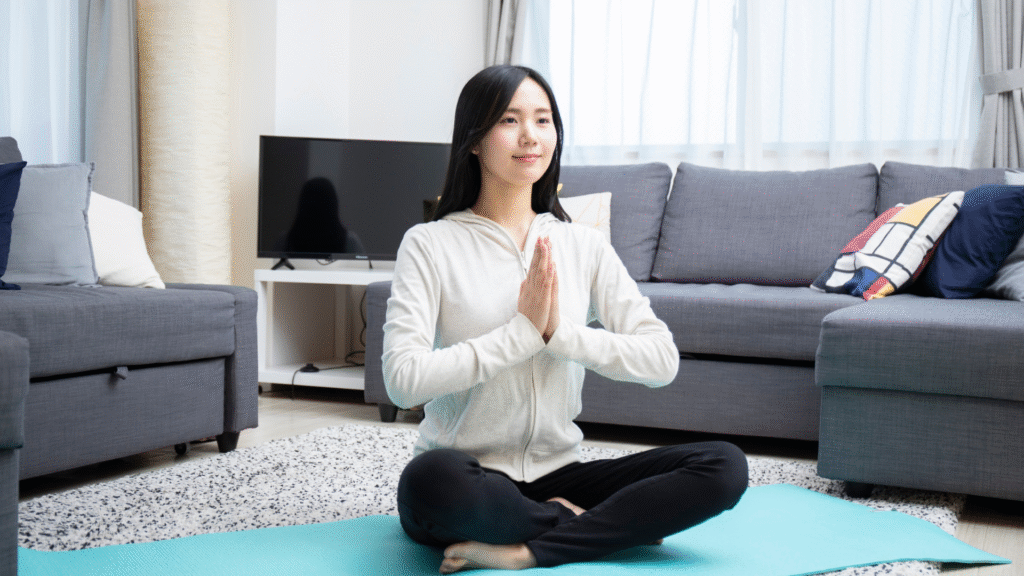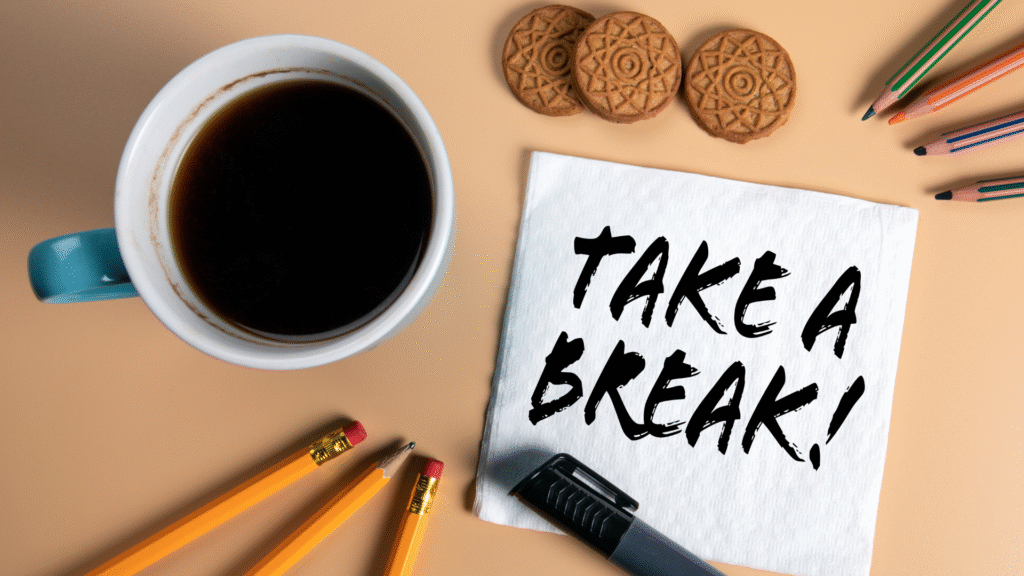Feeling overwhelmed? Learn 10 practical tips to relieve stress and calm your mind. Easy steps you can use every day to relax, recharge, and find balance.

Table Of Content
- Introduction
- Practice Deep Breathing
- Exercise Regularly
- Get Enough Sleep
- Practice Mindfulness or Meditation
- Stay Organized
- Connect with Loved Ones
- Limit Caffeine and Sugar
- Take Short Breaks
- Spend Time in Nature
- Practice Gratitude
- Conclusion
Introduction

Stress is something every person experiences. A demanding job, family responsibilities, financial issues, or even constant notifications on your phone can make your mind feel restless. While stress is sometimes normal and it is even helpful in motivating us to act, too much stress can be harmful.
Chronic stress can cause various problems such as high blood pressure, poor sleep, weakened immunity, anxiety, and even depression. That is why knowing how to manage stress is not just a luxury, but it is a necessity for your well-being.
The good news is you do not need expensive therapy sessions or complicated programs to feel stress-free. You can bring more peace into your life with a few small lifestyle changeshttps://www.healthline.com/nutrition/16-ways-relieve-stress-anxiety.
In this article, we will explore 10 proven and practical tips to relieve stress and calm your mind. These tips are backed by science, easy to apply, and practical for everyday use.
1. Practice Deep Breathing

Your breathing often becomes shallow and quick when you are stressed. It gives a signal to your brain that something is wrong, which increases anxiety. Deep breathing does the opposite; it tells your body to relax.
How to try it:
- In a quiet place, sit comfortably.
- For four seconds, inhale deeply through your nose.
- Hold your breath for two seconds.
- For six seconds, exhale slowly through your mouth.
- Repeat for 5–10 minutes.
This simple technique is known as diaphragmatic breathing or box breathing, and it is widely used by professional athletes and therapists.
Real-life example: Imagine you are about to give a presentation and your heart starts racing. Taking just 2–3 minutes to breathe deeply. It will help to lower your heart rate, clear your mind, and boost your confidence.
Benefit: It gives a calmer nervous system and relaxation.
2. Exercise Regularly

Exercise is one of the most powerful stress relievers available. When you move your body, it helps you to release endorphins, natural chemicals that improve mood and reduce stress.
You do not need to spend time in the gym. Simple activities such as stretching, walking, cycling, or even dancing in your living room can work wonders.
Science-backed fact: A Harvard study found that you can significantly reduce stress levels just by 20–30 minutes of brisk walking each day.
Ideas to get moving:
- For a 20-minute go for evening walk.
- Before bed, try yoga or stretching exercises.
- Instead of elevators, use stairs.
- Turn on your favorite music and dance.
Benefit: It helps to reduce anxiety, improve focus, and help you sleep better.
3. Get Enough Sleep

Sleep and stress are deeply connected. Your mind becomes more reactive to stress when you don’t get enough rest. At the same time, being stressed makes it difficult to fall asleep, which is a vicious cycle.
Tips for better sleep:
- Create a bedtime routine: take a warm shower, dim the lights, or read a book.
- In the evening, avoid caffeine or heavy meals.
- Keep your room cool, quiet, and dark.
- Even on weekends, stick to a consistent sleep schedule.
Real-life scenario: If you have been working late at night on your laptop, your brain stays alert because of the blue light. An hour before bed, turning off screens helps your body prepare for sleep.https://heathyhabit.online/
Benefit: It helps to restore energy, balance mood, and make you more resilient to stress.
4. Practice Mindfulness or Meditation

Mindfulness is about paying attention to the present moment without judgment. Instead of regretting your past or worrying about tomorrow, mindfulness helps you live in the present moment.
Ways to practice mindfulness:
- Sit quietly and focus on your breathing.
- Notice your surroundings, such as the sounds, smells, and sights.
- Eat slowly and try to pay attention to the taste and texture of food.
If you’re a beginner, meditation apps like Headspace or Calm can guide you. Start with 5 minutes a day and slowly increase.
Science-backed fact: Studies show that practicing regular mindfulness lowers cortisol (the stress hormone) and improves emotional well-being.
Benefit: It increases focus, calmness, and emotional control.
5. Stay Organized

Clutter in your home, desk, or schedule can be very stressful. Staying organized does not mean being perfect; it means making a system that will work for you.
Organization tips:
- Make a daily to-do list.
- Break large tasks into smaller and manageable steps.
- Once a week, declutter your workspace.
- To manage tasks, use digital tools like Google Calendar or Trello.
Example: Instead of stressing over a big assignment, break it into three smaller tasks: research, outline, and writing. Managing each step will give you a sense of progress.
Benefit: It helps to reduce overwhelm and increase confidence in handling responsibilities.
6. Connect with Loved Ones

Humans are social creatures. You can instantly lighten your emotional load by sharing your feelings with someone you trust.
Ways to connect:
- Call your friend just to talk.
- Have dinner with your family without distractions.
- Join a hobby club or community group.
Even short conversations can release oxytocin, a hormone that helps to reduce stress and strengthen emotional bonds.
Benefit: It helps to provide emotional support and reduces feelings of loneliness.
7. Limit Caffeine and Sugar
7. Limit Caffeine and Sugar

It’s tempting to grab another cup of coffee or a sugary snack when you are stressed. While they may give a quick energy boost, they often lead to irritability, energy crashes, or jitters.
Healthy alternatives:
- Replace coffee with herbal teas or green tea.
- Instead of candy, snack on fruits, nuts, or yogurt.
- Stay hydrated because sometimes thirst feels like stress.
Example: If you usually drink four cups of coffee a day, try to reduce it to two and replace the rest with water or decaf. You will notice fewer mood swings and better focus.
Benefit: It stabilizes energy, reduces stress-related crashes, and improves concentration.
8. Take Short Breaks

Working nonstop does not make you more productive; it increases burnout. You can refresh your brain with short breaks throughout the day.
Techniques you can try:
- Pomodoro technique: Work for 25 minutes, then rest for 5 minutes.
- Step outside to breathe fresh air.
- At your desk, do light stretches.
Science-backed fact: Studies show that you can increase productivity, creativity, and overall job satisfaction by taking micro-breaks.
Benefit: It helps prevent fatigue, boost efficiency, and keep stress under control.
9. Spend Time in Nature

Nature has a natural calming effect. You can refresh your mind with the sound of birds, the feel of fresh air, or even a short walk in the park.
Ideas for nature therapy:
- Morning or evening walk in a park.
- Gardening at home.
- Hike or picnic on the weekend.
- With natural light, sitting by a window.
Science-backed fact: Japanese “forest bathing” (shinrin-yoku) has been proven to improve mood, lower blood pressure, and reduce stress hormones.
Benefit: It gives natural relaxation and improved mental health.
10. Practice Gratitude

Gratitude can shift your focus from what’s wrong to what’s right in your life. You can reframe your mindset by writing down a few things you are thankful for daily.
How to practice gratitude:
- Keep a small journal and each night write three things you are grateful for.
- Say thank you more often to your friends or loved ones.
- Instead of only big achievements, reflect on your small daily wins.
Example: Be grateful you have a safe car and reached home eventually instead of stressing about traffic.
Benefit: It helps to create positivity, reduce negative thinking, and build emotional resilience.
Conclusion

You cannot avoid stress, but it does not have to control your everyday life. You can take charge of your well-being by practicing deep breathing, exercising regularly, getting enough sleep, and adopting these 10 proven tips to relieve stress and calm your mind.
Remember: Start with one or two that feel easiest for you, such as taking short breaks or writing in a gratitude journal. You do not need to apply all the tips at once. You can transform your mental health with small steps and consistency.
Take action today: Right now, choose one strategy from this list and try it. Your mind and body will thank you.
